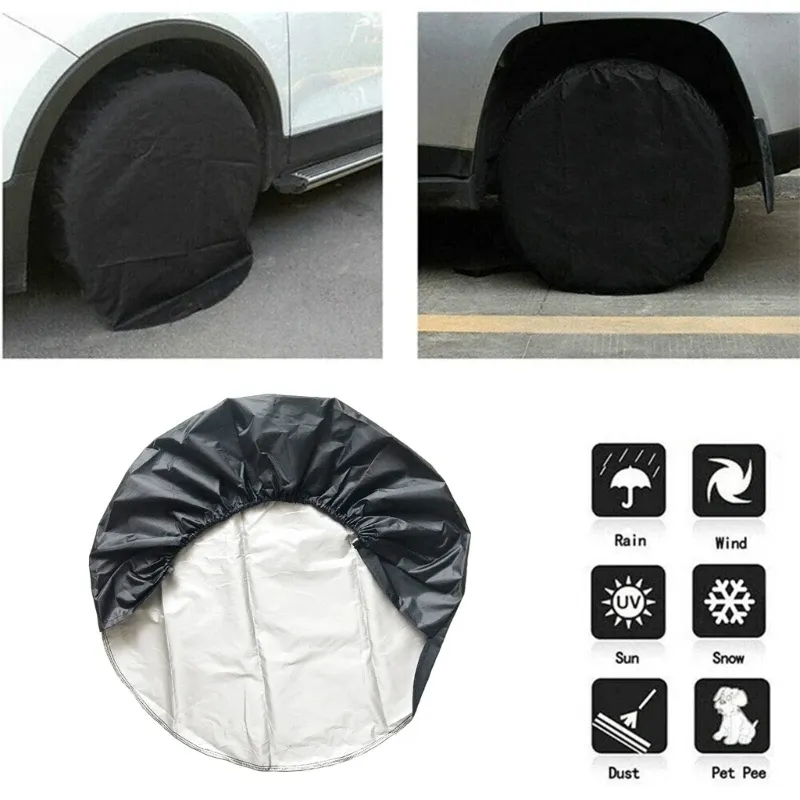Introduction
Why Protecting Your RV Tires is Essential
Owning an RV is a significant investment, and maintaining its various components is crucial for longevity and performance. One of the most overlooked yet essential parts of RV maintenance is protecting your tires. RV tires are subjected to intense environmental conditions, including direct sunlight, rain, snow, and fluctuating temperatures. These factors can cause premature aging, dry rot, and cracking, leading to potential blowouts that could result in costly repairs or even accidents.
The Benefits of Using RV Tire Covers
RV tire covers serve multiple purposes beyond just covering your tires when your vehicle is parked. They provide protection against UV rays, prevent rubber degradation, reduce heat buildup, and keep your tires in optimal condition. Additionally, they can prevent rodents and pests from nesting inside the tire’s crevices. For those who store their RVs for extended periods, tire covers can significantly prolong tire life and save money in the long run.
What This Guide Covers
In this comprehensive guide, we will explore the importance of selecting the right RV tire covers, how to measure your tires correctly, the best materials for durability, maintenance tips, and frequently asked questions. By the end, you will be fully equipped with the knowledge needed to make an informed decision when purchasing RV tire covers.

Understanding RV Tire Cover Sizes
Different Types of RV Tire Covers
RV tire covers come in various designs and styles, depending on your needs:
- Single Tire Covers: Designed for individual tires, these are the most common type and are easy to install.
- Dual-Axle Covers: These cover two tires simultaneously and provide additional protection, particularly for larger RVs.
- Full Tire Protectors: These are custom-fitted covers that encase the entire tire, offering maximum protection against harsh weather and debris.
- Custom-Fit Covers: These are tailor-made for specific RV models and ensure a perfect fit, preventing wind lift and exposure to the elements.
Why Getting the Right Size Matters
Choosing the correct size tire cover is vital for ensuring full coverage and protection. A cover that is too loose can be blown away by the wind, while a cover that is too tight may be difficult to install and could cause wear and tear due to excessive stretching. The right size will create a secure, snug fit that protects against environmental damage.
Key Factors to Consider When Selecting a Size
- Tire Diameter: Always measure your tire diameter from edge to edge, passing through the center.
- Tire Width: Measure from sidewall to sidewall to ensure complete coverage.
- Elastic vs. Strap Closure: Some covers use elastic hems for easy installation, while others feature adjustable straps for a more secure fit.
- Storage Conditions: If you store your RV outdoors in a high-wind area, opt for covers with additional fasteners.
How to Measure Your RV Tires for Covers
Step-by-Step Guide to Measuring Your Tires
- Locate the Tire Size on the Sidewall: Most RV tires have their size imprinted on the sidewall. This will usually be in the format of something like 235/80R16, where the last number indicates the rim size.
- Measure the Diameter: Using a tape measure, record the full diameter of the tire.
- Measure the Width: Measure from one sidewall to the other.
- Compare with Manufacturer Charts: Once you have your measurements, cross-check them with the cover manufacturer’s sizing chart.
Tips for Accurate Measurements
- Always measure tires when they are fully inflated to get precise dimensions.
- If you are unsure, size up slightly to ensure full coverage.
- Consider the thickness of tire treads, which can affect measurements.
Common Mistakes to Avoid
- Guessing the size instead of measuring.
- Buying universal covers that may not fit snugly.
- Forgetting to account for wheel chocks if they remain on during storage.
Choosing the Right Material for Your RV Tire Covers
Different Materials Available
Tire covers come in different materials, each offering unique benefits:
- Vinyl: UV-resistant, waterproof, and highly durable, making it one of the most popular choices.
- Polyester: Lightweight and breathable, ideal for preventing moisture buildup inside the cover.
- Canvas: Extremely durable and resistant to tearing but requires regular maintenance to prevent mold.
- Aluminum-Coated Covers: Reflect heat and provide excellent insulation, ideal for hot climates.
Pros and Cons of Each Material
- Vinyl: Excellent for all-weather protection but may crack over time if exposed to extreme heat.
- Polyester: Easy to store and lightweight but may not provide as much insulation.
- Canvas: Sturdy and long-lasting but needs proper care to prevent mildew.
- Aluminum-Coated Covers: Great for reflecting sunlight but can be expensive.
Factors to Consider When Choosing the Material
- Climate Conditions: Hot regions require UV-resistant materials, while wet climates benefit from waterproof covers.
- Durability Needs: If you travel often, opt for heavy-duty covers.
- Ease of Installation: Lighter materials like polyester are easier to put on and take off.
Maintaining and Caring for Your RV Tire Covers
Proper Cleaning and Storage Tips
- Use mild soap and water to clean the covers; avoid harsh chemicals.
- Ensure covers are dry before storage to prevent mold and mildew.
- Store in a cool, dry place when not in use to prolong lifespan.
Repairing and Replacing Damaged Covers
- Small tears can be fixed using fabric repair kits.
- Heavily damaged covers should be replaced to maintain tire protection.
Expected Lifespan of Different Materials
- Vinyl: 3-5 years with proper care.
- Polyester: 2-4 years, depending on exposure levels.
- Canvas: 5+ years if well-maintained.
- Aluminum-Coated Covers: Can last up to 10 years with regular upkeep.
Frequently Asked Questions
1. What Are the Best RV Tire Covers?
Top-rated brands include ADCO, Classic Accessories, and Camco, which offer durable and weather-resistant options.
2. How Do I Know If My Tire Covers Fit Correctly?
A properly fitted cover should be snug but not overly tight, with no significant gaps or loose sections.
3. Can I Use Regular Car Tire Covers for My RV?
No, RV tire covers are designed for larger, heavier-duty tires and provide better protection.
Conclusion
Choosing the right RV tire covers is a critical step in protecting your vehicle’s tires from the elements, extending their lifespan, and ensuring a smooth ride for years to come. By understanding sizing, selecting the right materials, and maintaining your covers properly, you can maximize your investment and prevent costly tire replacements. Invest in high-quality tire covers today, and enjoy peace of mind knowing your RV is well-protected whether parked at a campsite or in storage.
